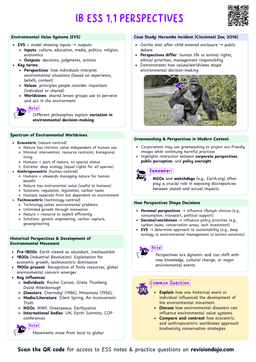Ecological Economics vs. Environmental Economics
Ecological economics
Ecological economics is an interdisciplinary field that studies the relationship between economic systems and the environment, recognizing that the economy operates within the Earth's ecological limits.
It emphasizes sustainability, the value of natural capital, and the integration of ecological and social factors into economic decision-making.
Core Principles of Ecological Economics
The Economy as a Subsystem
- The economy is part of the biosphere, meaning economic activity depends on natural capital (ecosystems, biodiversity, and resources).
- Finite planetary boundaries limit how much the economy can grow.
Natural Capital & Sustainability
- Natural capital (e.g., forests, soil, water, air) is just as valuable as financial, human, and physical capital.
- Unlike traditional economics, which treats nature as a resource for exploitation, ecological economics prioritizes conservation.
The Precautionary Principle
If an action might cause harm to the environment, precautionary measures should be taken even if scientific certainty is lacking.
Banning pesticides suspected of harming pollinators before conclusive proof emerges.
Emphasis on Circular Economy
- Reducing waste and ensuring resources stay in use for as long as possible.
- Encouraging recycling, reusing, and regenerative design.
The Ecological Economics Model
Biosphere (Natural System)
- Inputs: Solar energy fuels all life processes.
- Provides: Raw materials, ecosystem services, biodiversity.
Economic Subsystem (Human Economy)
- Uses: Natural resources (e.g., fossil fuels, minerals, forests) for economic activity.
- Produces: Waste, pollution, and low-grade thermal energy loss.
Core Idea:
- Traditional economics ignores ecological limits and prioritizes GDP growth.
- Ecological economics advocates for a steady-state economy, where consumption stays within planetary limits.
Economic Valuation of Ecosystem Services: Environmental vs. Ecological Economics
Both environmental and ecological economics deal with valuing ecosystem services, but their approaches differ:
| Environmental economics | Ecological economics |
|---|---|
| Seeks to integrate environmental concerns into traditional economic models. | Views the economy as a subsystem of the environment. |
| Values ecosystem services based on market principles (e.g., carbon trading, fines for pollution). | Emphasizes natural capital and sees environmental protection as essential for long-term survival. |
| Uses economic tools like cost-benefit analysis, taxes, and market incentives to encourage sustainable resource use. | Applies the precautionary principle, advocating for conservation before damage occurs. |
| Examples: Carbon pricing, pollution taxes, and tradeable permits. | Examples: Paying developing countries to preserve natural assets instead of exploiting them. |
Valuing Ecosystem Services in Ecological Economics
Ecological economics places a greater emphasis on the value of natural ecosystems beyond their immediate economic use.
Some key points:
Traditional economics values forests primarily for timber production.
Ecological economics considers additional values:
- Ecosystem Services: Carbon sequestration, water purification, soil fertility.
- Aesthetic & Recreational Value: Ecotourism, scenic beauty.
- Biodiversity & Ethical Value: Preserving species and ecosystems for future generations.
Payment for Ecosystem Services (PES): The Role of Resource-Depleted vs. Resource-Rich Countries
- Some developed countries have depleted their natural resources for industrial and economic growth. To address this, they may pay developing nations to conserve their ecosystems rather than exploiting them.
- 🌍 Concept: Wealthier, industrialized nations provide financial compensation to countries with rich natural ecosystems to prevent deforestation, overfishing, or other environmental degradation.
- 🔄 Goal: Encourage sustainable conservation instead of resource depletion for short-term economic gain.
REDD+ (Reducing Emissions from Deforestation and Forest Degradation):
- A UN program where developed countries compensate developing nations to maintain forests instead of clearing them.
- Recognizes that forests provide climate benefits beyond timber (carbon storage, biodiversity).
Payment for Ecosystem Services (PES): Issues and Challenges
While PES can encourage conservation, several challenges and issues limit its effectiveness.
Equity and Fairness
- Who gets paid? Payments often go to landowners or governments, while indigenous communities who rely on these ecosystems may not benefit.
- Historical injustice: Many developed countries have already exploited their resources but now pay others to conserve. This can create resentment and distrust among developing nations.
Economic Dependency & Long-Term Sustainability
- Countries receiving payments may become dependent on external funding rather than developing sustainable local economies.
- If funding stops, these nations might revert to resource exploitation for economic growth.
Market-Based Nature of PES
- PES assigns a monetary value to nature, which may undermine intrinsic environmental ethics.
- If conservation becomes a financial transaction, ethical and cultural motivations for preserving nature may weaken.
Governance and Corruption
- Some governments or organizations may misuse PES funds, leading to ineffective conservation efforts.
- Weak governance may result in money not reaching local communities, causing conflicts.


